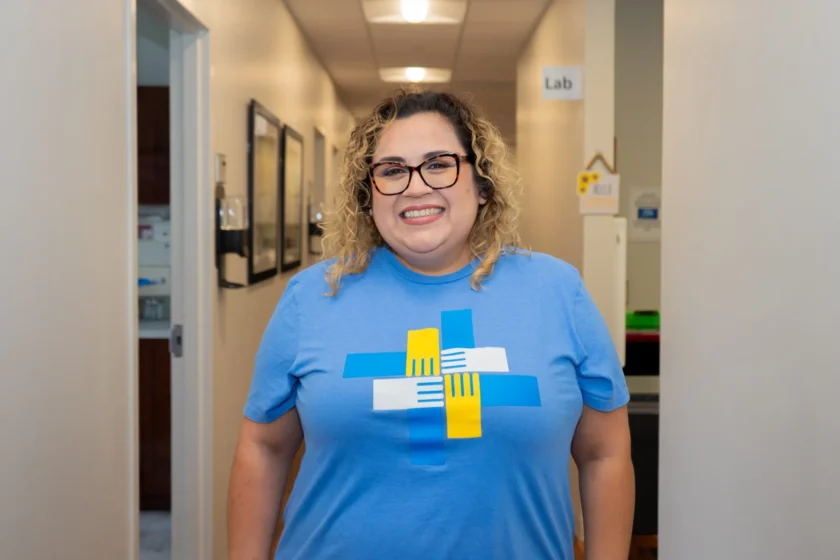Needs Navigation

Reflections from the March 2025 Policy Consortium Navigators’ Roundtable featuring Karla Alvarado, Community Health Manager, BSWH Community Care Clinics
By Anita Reynolds
Photo credit: How this Fort Worth community health worker goes ‘the extra mile’ for low-income patients | Fort Worth Report
When we talk about improving healthcare and making it more person-centered, we need to begin by listening, truly listening to the people who are working directly in communities every day. That is the heart of Policy Consortium – listening to real people talk about their experiences, and how we can learn from them about identifying practical solutions that are scalable.
About the Policy Consortium
Policy Consortium brings together patients and communities who have been historically excluded from healthcare reform conversations. It is a place to hear their lived experiences and learn from their perspectives on the issues that matter most. Because real reform begins with the people most impacted.
Our goal is to ensure that health care policies and practices are shaped by the needs and priorities of patients and caregivers.
Voices from the Frontlines: Karla Alvarado on Navigating Care with Compassion
At our March 2025 Policy Consortium convening, we had the privilege of hearing from Karla Alvarado, Community Health Manager at BSWH Community Care Clinics. Karla leads a team that works to address the social determinants of health in underserved communities, focusing especially on issues like food insecurity and access to care. Her work centers on empowering people with the tools, information, and support they need to navigate systems that are often complex and confusing.
During the Navigators’ Roundtable, Karla emphasized a theme that resonated with many of us:
“We’re all fighting the same battle. Whether someone is called an advocate, a navigator, or a community health worker, the goal is the same. People need someone by their side who understands both the medical system and their personal reality.”
This kind of relational, person-centered guidance is at the core of what makes Needs Navigation so essential.
From Silos to Systems that Work for People
When asked how we can expand Needs Navigation across more care settings, Karla was clear that education is the first step. Too many individuals in her community, and across the country, simply do not know where to go or how to get the help they need. Many are not taught the difference between when to go to the emergency room and when to make a routine visit with a doctor. They do not know how to access available resources or complete the paperwork required to qualify. And in many health care environments, there is no one whose role is to help guide them through it all.
Karla put it plainly: “Ask people if they have someone to help them. Ask providers if they have someone on their team who knows how to educate and navigate. That’s where change begins.”
What Policymakers Need to Understand
If Karla had a chance to speak directly to policymakers, her message would be simple and direct.
“Healthcare today is reactive. But community health workers make it proactive.”
She went on to explain that community health workers do far more than connect people to services. They help reduce unnecessary emergency room visits, remove barriers to care, and empower families with knowledge that lasts. And when one person learns something new, they almost always pass it on to others.
“You help one person, and they help others. It spreads. That is how communities are transformed.”
What Keeps Karla Going
What inspires Karla is not just the big changes, but the small, meaningful moments that grow over time. She shared how a simple act like helping someone download an app for the food bank can ripple outward.
“Months later, they tell me they helped their sister, their friend, their comadre. That’s what keeps me going. Empowering one person creates a ripple effect.”
That ripple effect is what sustains so many of us. Because the chance to help someone—no matter how small the gesture—is not just a privilege. It’s a lasting impact.
So helping people is what we want to equip you to do, but not in the professional way that Karla does it. We want to equip you with the “conversation starters” so that people in your communities know to ask for the Karlas. And if there isn’t a Karla there to help, we can nudge them to ask why isn’t there one? Or how can we make it so that we have community health workers and navigators more accessible?
Join Us on August 21
That’s why in our next webinar, we will provide you with the resources and words to describe what Needs Navigation is, why it matters, and how to advocate for it in ways that resonate.
How to Talk About Needs Navigation and Why It Matters
Wednesday, August 21
3:00 to 4:00 PM ET
Register here
What You Can Do Next
Meaningful change begins with listening and continues with action. Whether you are a policymaker, provider, advocate, or community leader, you can make a difference.
Together, we can build a health care system that truly works for all of us.
